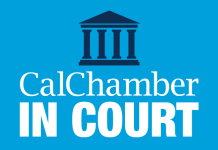A California Chamber of Commerce-opposed bill that requires double pay for work on Thanksgiving awaits action by the Assembly. A previous version of the bill failed to pass the Assembly last year.
CalChamber remains opposed to the amended version of AB 67 (Gonzalez; D-San Diego) because it unfairly targets two classifications of employers, increases their costs, and creates a competitive disadvantage by forcing them to recognize Thanksgiving as a “family holiday” and compensate all employees with double the regular rate of pay for work performed on that day.
Discriminates Against Two Classifications of Employers
The author of AB 67 has argued the bill is needed to compensate employees who are forced to give up their family time to work on Thanksgiving. The most recent amendments to AB 67 indicate otherwise.
AB 67 now targets only two industries—retail store and grocery store establishments—to force them to pay double the “regular rate” of pay on a “family holiday,” defined as Thanksgiving. Any other employer that opens on Thanksgiving can continue to pay its employees minimum wage.
This discriminatory treatment of only two classifications of employers demonstrates that AB 67 is intended to punish retail and grocery stores, rather than compensate employees for time away from their family on Thanksgiving, as the author has argued.
Creates Competitive Disadvantage for California Employers
AB 67 unilaterally increases the cost of doing business only for employers that have a “physical store” in California, thereby automatically placing them at a competitive disadvantage with online retailers and out-of-state businesses that would not be subject to this costly mandate.
Out-of-state employers that sell their merchandise online still could do so under AB 67 without the increased cost, yet a California-based employer could not.
Recently, the Legislature tried to even the playing field between online retailers and brick-and-mortar stores in the sales tax arena. AB 67 would further distort this playing field by increasing the cost of doing business for local employers, as opposed to online and out-of-state retailers, who would not have to comply.
Employees in These Industries Generally Receive Higher Compensation for Working on Thanksgiving
Many “retail store establishment” employers surveyed confirm they voluntarily pay their employees time-and-a-half for work performed on Thanksgiving. Notably, most of these employers open only for a limited time on Thanksgiving and, therefore, the hours any employee is required to work are minimal.
Numerous grocery store establishments covered by AB 67 also pay increased compensation to employees on Thanksgiving, as negotiated through the collective bargaining process, yet still would be subject to AB 67 as the establishments do not qualify for the bill’s collective bargaining exemption.
Despite this general industry standard of higher compensation, AB 67 seeks to increase these employers’ costs even further by mandating double the “regular rate” of pay. If these targeted employers change their behavior and open at 12:01 a.m. on the Friday following Thanksgiving, employees will lose out on the extra compensation they currently are receiving for work performed on this day.
It should be noted that numerous employees even volunteer for shifts on Thanksgiving to earn additional compensation that is offered.
Regular Rate of Pay and PAGA Enforcement
AB 67 does not require double payment of the employee’s hourly rate, but rather double the employee’s “regular rate” of pay. The difference is significant.
Determining the regular rate of pay of many employees requires a detailed calculation that goes beyond an employee’s hourly pay. As defined by the Division of Labor Standards Enforcement (DLSE), the “regular rate of pay includes a number of different kinds of remuneration, for example hourly earnings, salary, piecework earnings, commissions, certain bonuses, and the value of meals and lodging, ” according to the DLSE enforcement policies manual.
Although this calculation is performed for overtime purposes, it is subject to good faith errors as to what types of “remuneration” should be included in the calculation.
Due to their inclusion in Section 511.5 of the Labor Code, the provisions of AB 67 are subject to the Private Attorneys General Act (PAGA; Labor Code Section 2698 et seq.). Good faith errors made in calculating the regular rate of pay or failure to comply with other provisions of AB 67 would be subject to PAGA and add another threat of litigation against California employers.
PAGA lawsuits in California increased more than400% between 2005 and 2013, given the ease of filing such cases without satisfying class action requirements and the potential financial windfall, according to the April 16, 2014 Los Angeles Daily Journal article, “An Alternative to Employee Class Actions.”
The Governor’s proposed budget for 2016 indicates more than 6,000 PAGA notices were filed with the Labor and Workforce Development Agency in 2014.
Provides Preferential Treatment for One Day Out of the Year That Not All Recognize as a Family Holiday
AB 67 provides that employers shall compensate an employee at no less than twice the employee’s regular rate of pay on a “family holiday,” defined as “the fourth Thursday of November of each year,” commonly referred to as Thanksgiving.
While recognizing this holiday may seem acceptable to some persons, other individuals may believe that different days of the year deserve the same state recognition as a “family holiday.” Providing preferential treatment for one holiday and elevating its significance by labeling it in state statute as a “family holiday” may be offensive to employees or employers that recognize or believe other days within the year deserve that same recognition.
Action Needed
AB 67 is awaiting action on the Assembly Floor and is facing the January 31 deadline to pass to the Assembly.
Contact your Assembly members and urge them to oppose AB 67.
Staff Contact: Jennifer Barrera


